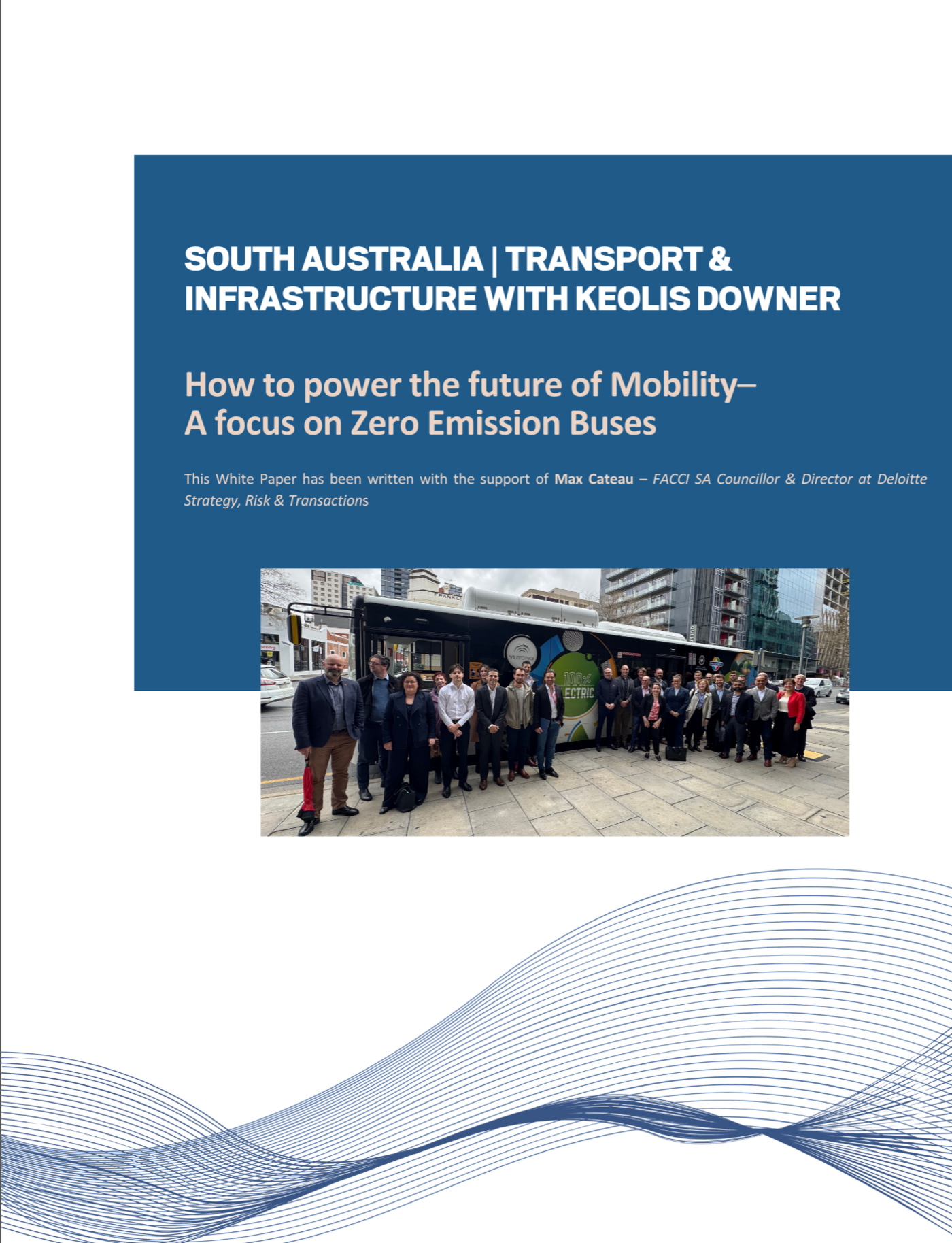White paper - How to power the future of Mobility - A focus on Zero Emission Buses

Abstract
Explore green hydrogen's role in zero-emission transit, SA’s challenges with renewables, charging fleets & debunking ZEB myths.
Summary
Earlier that year, the South Australian Government announced that it would bring forward its renewable energy target by three years. Under the ambitious new target, electricity generation would be sourced from net 100 percent renewables by 2027. Enabled by this abundance of renewable energy, the South Australian Government began trials of hydrogen and battery electric powered buses as it accelerated SA towards zero-emission public transport.
On 19 September 2024, the French-Australian Chamber of Commerce (FACCI), in collaboration with Keolis Downer, hosted a key event that explored the future of zero emission buses (ZEBs) in South Australia. The session explored the following themes:
a. The green hydrogen opportunity and how it could fuel zero-emission public transport
b. The challenge of harnessing renewables and the value chain required to charge bus fleets economically
c. The myths often associated with ZEBs
Moderator:
Chris Stinchcombe – Director for South Australia, Keolis Downer
Panellists:
- Phil Agnew – Director of Asset Management, Department of Infrastructure & Transport
- Joanna Kay – Smart Council Representative
- Jonathan Anderson – Sustainable mobility manager, Keolis Downer
This white paper summarises the key takeaways from the event based on the themes described above and discusses the opportunities and challenges associated with transitioning South Australia’s bus fleet to zero emissions.
Adressing Key Questions
(a) The Green Hydrogen Opportunity
Green hydrogen, produced using renewable energy through electrolysis, is a key solution for powering long-range zero-emission buses (ZEBs). South Australia is well-positioned to lead this transition, with an abundant supply of renewable energy. The state is already producing more electricity than needed, opening up opportunities for large-scale hydrogen production, especially with hydrogen being a critical part of the state's ambition to reach net-zero emissions by 2050.
- Current Trials and Technology Insights:
Hydrogen-powered buses are currently undergoing trials in South Australia, and initial feedback has been positive. These buses provide greater range and reliability, particularly for routes with high utilisation and demanding terrain, such as the Adelaide Hills. The key challenge remains the cost of hydrogen production and the complexity of refuelling infrastructure, which requires sophisticated pressure and temperature management to refuel in just 5-10 minutes under optimal conditions. However, hydrogen refuelling stations are limited, and scaling up both supply and demand for hydrogen will be crucial for further deployment.
- Benefits of Hydrogen Buses:
The two primary advantages of hydrogen buses over electric ones are faster refuelling times—crucial for high-frequency routes where even short downtimes are costly—and their reduced weight compared to battery-electric buses, making them more suited for long-distance services. However, for the vast majority of public transport routes (over 90%), current electric bus technology is more cost-effective, with hydrogen seen as a potential solution for the remaining 10% of high-demand applications. Note: This is a potential solution in a ZEB world. Currently the transition of the remaining 10% of high-demand applications is more suited to internal combustion engine bus. The government is focused...